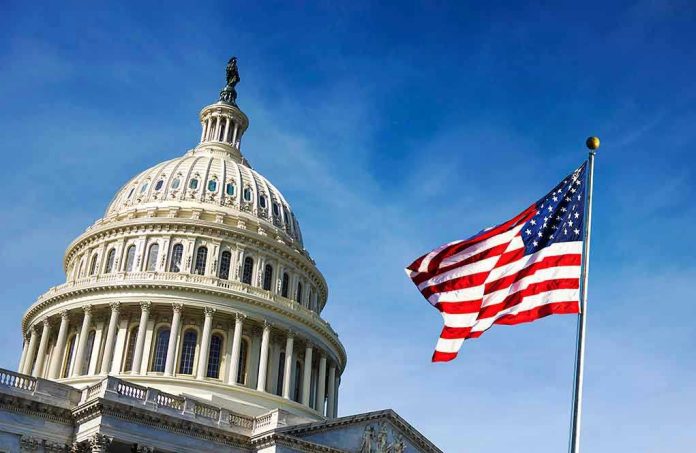
Conservative lawmakers are advancing a sweeping fiscal reform bill that targets wasteful spending, restores constitutional limits, and finally reins in bloated entitlement programs—setting up a major battle over the future of Medicaid and federal student loans.
Story Snapshot
- EPIC’s new policy memo urges Congress to use reconciliation for deep Medicaid cuts, student loan restrictions, and regulatory rollbacks.
- Trump’s first major “one big, beautiful bill” passed in May, paving the way for this aggressive second reform push.
- House and Senate Republicans are clashing over the scope of proposed entitlement reforms and spending reductions.
- Experts warn of significant impacts on healthcare access, state budgets, and vulnerable populations if reforms advance unchanged.
Conservative Roadmap Charts a New Course for Fiscal Discipline
A conservative think tank, the Economic Policy Innovation Center (EPIC), has delivered a detailed policy roadmap to GOP congressional leaders, outlining aggressive reforms to Medicaid, student loans, and government pensions. The memo urges lawmakers to leverage budget reconciliation—a process allowing passage with a simple Senate majority—to advance these proposals and bypass Democrat obstruction. This push comes as Republican voters demand action to reverse years of unchecked spending, inflation, and dependence on inefficient government programs.
EPIC’s recommendations follow the passage of President Trump’s first major legislative win in May, which delivered tax cuts and spending reforms. Now, with razor-thin GOP majorities in both chambers, conservatives are seizing the momentum to pursue deeper entitlement reforms. The second reconciliation bill would impose per capita caps on Medicaid funding, restrict eligibility and benefits, and eliminate enhanced federal matching rates—measures designed to shrink federal outlays and return power to states. Similar changes are suggested for federal student loan programs, with new restrictions on eligibility and repayment benefits.
GOP Lawmakers Weigh Aggressive Medicaid and Student Loan Changes
The House Budget Committee, under the leadership of Rep. Jodey Arrington (R-TX), has circulated a detailed list of proposed cuts, reflecting EPIC’s recommendations. Fiscal conservatives in the House Freedom Caucus are pressing for even deeper reductions, determined to trim the deficit and restore discipline to Washington’s budget process. However, the Senate remains more cautious, with some moderates warning about the potential backlash from affected constituents and the uncertainty created by abrupt changes to essential programs.
While Republicans agree on the need for reform, the scope and pace of cuts remain contentious. The reconciliation process, previously used for major policy shifts in 2017 and 2021, allows the GOP to circumvent the filibuster and secure crucial wins even with narrow majorities. This legislative strategy is expected to fuel partisan tensions, as Democrats and advocacy groups mobilize to defend Medicaid and student loan programs from what they call “draconian” rollbacks.
Potential Impact: States, Families, and the Future of Entitlements
Policy analysts and advocacy groups have issued stark warnings about the real-world consequences of the proposed reforms. Healthcare experts caution that per capita caps on Medicaid could force states to ration care, reduce provider payments, or cut eligibility for vulnerable populations, including low-income families and seniors. LeadingAge, a group representing older adults, warns of “huge gaps in care” if federal support is slashed. Education advocates highlight that stricter student loan rules could limit college access for working-class students, undermining upward mobility for American families.
Conservative roadmap targets Medicaid, student loans for Trump's 'big, beautiful' sequel https://t.co/jxiavn1s8O
— Fox News (@FoxNews) August 19, 2025
Despite these concerns, fiscal conservatives contend that runaway spending on entitlements is unsustainable and undermines the nation’s financial security. They argue that reforms are necessary to restore constitutional limits on government and prevent future crises driven by debt and inflation. The ongoing negotiations in Congress reflect the broader debate over the proper role of federal government and the need to protect American taxpayers from overreach and reckless promises.
Sources:
Conservative roadmap targets Medicaid, student loans for Trump’s ‘big, beautiful’ sequel
House passes reconciliation bill and Senate next steps
Republicans clash on competing reconciliation plans













